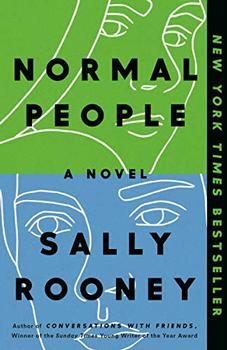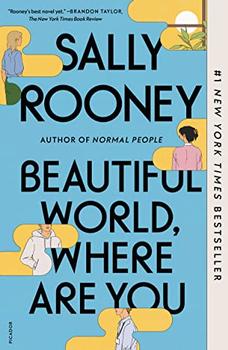Summary | Excerpt | Reading Guide | Reviews | Beyond the book | Read-Alikes | Genres & Themes | Author Bio

In Sally Rooney's exquisite second novel, Normal People, Marianne Sheridan is contemptuous of her ordinary life. A daughter of privilege, her mother and brother are neglectful, cruel, and cold enough to freeze icicles. Their hostility toward Marianne causes her to withdraw into her bedroom and remain invisible.
Connell Waldron is a classmate of Marianne's, a bright and popular boy, albeit terribly quiet, who Marianne envies from afar and whose mother cleans for Marianne's family. Connell is initially put off by Marianne's weirdness. She's an outcast at secondary school, someone who is religiously stared at, talked about in whispers, mocked, and regarded as unimportant.
It's a trick of culture that the peculiar girl and the handsome boy find one another beguiling. Marianne has financial resources but is missing love. Connell has love but is being raised by a single mother. They share academic stardom – and loneliness – and they soon become secret lovers in that laconic way of the very young who think by being together they are somehow tricking the world. But in the cold light of day their sexual attraction has them confused: "He kept thinking of himself saying to Marianne in bed: I love you. It was terrifying."
In the Irish town where the story takes place, the Debs is a prom kind of affair, a formal dance to celebrate students in their last year of secondary school, and a hurrah before graduation. Connell is conflicted. If he takes Marianne to the Debs everyone will know his secret and will conjure up Marianne jokes at his expense. Selfishly, he wants two things at once. His popularity and her eroticism, both on his terms. He is saved from deciding when the mindless socialite of his clique asks him to be her date. When Marianne finds out she cuts off all contact with Connell. And with secondary school.
Then they are off to college. Sally Rooney portrays Trinity College, Dublin – which is her alma mater – with reverence, a place that nurtures passion, social hedonism, and academic challenges. Connell feels as if he is renting space. It's the opposite for Marianne. Trinity comes at a perfect time. She buries her resentment about the Debs and reinvents herself as a party girl. She smokes and has a gallery of friends whose energy she bounces off of, and oddly, she and Connell's social positions are reversed. She is the popular one now. Popularity, though, has not erased her self-loathing. A cruel boyfriend pushes her into the sort of sexual violence she can rationalize given her minuscule amount of self-worth.
When Connell eventually finds love and compassion in a girl named Helen Brophy, Marianne is stunned.
Are you in love with her? she says.
Yeah, I do love her, yeah.
Now Marianne starts crying, the most embarrassing thing that has happened to her in her entire adult life.
Helen is attracted to the best part of Connell – best meaning his benevolent side – and just doesn't recognize his anxiety. She is coldly indifferent to his weaknesses because she is so well adjusted and expects her boyfriend to possess the same kind of frivolous normalcy. But Marianne sees Connell fully. And even though they are both involved with other people, they continue to attract one another.
Normal People won the Costa Novel Award, an annual award bestowed upon writers who reside in Ireland and the UK for a significant work. Sally Rooney is 27 years old. Her thirst for dialogue and her canny wit has a breezy engagement. She curates the cynical beauty of millennials better than any fiction writer I have read, and it is her greatest instrument as a writer, this tragicomedy oeuvre, that forces you to stay reading after you told yourself you would stop and go to bed. But she is more than just a fiction writer. You can come to her when you need a generation's hostility explained. She's a social critic, politically sensitive, and then a writer of fiction. Her empathy for the romantic arc that takes groups from agony to ecstasy with a little bit of humor and sex thrown in sets her fiction apart.
The characters in Normal People glow in the dark, in spite of – and perhaps, because of – their humiliations and neuroticism, which is a testament to Rooney's ability to create real, multifaceted characters. She makes the self-indulged feel ordinary. It's not that different from Fitzgerald's spoiled class fetishization in The Great Gatsby.
All 20-somethings, attractive or not, wealthy or not, soon learn the world is often vulgar and it can, for sure, make you feel vulnerable when you need to be loved. To survive, Marianne and Connell cling to each other, despite the meaningless sex and repetitive heartbreaks and violent partners they satiate themselves with. Like the sun, they know the other will rise in the morning. They rely on that dependability.
Therein is the silent beauty of Normal People. It speaks to something more involved than the anxiety of young love. It is the art of what is left behind when lovers break-up but still need to be close to one another. Sometimes, happily ever after is about friendship.
![]() This review was originally published in The BookBrowse Review in April 2019, and has been updated for the
March 2020 edition.
Click here to go to this issue.
This review was originally published in The BookBrowse Review in April 2019, and has been updated for the
March 2020 edition.
Click here to go to this issue.

If you liked Normal People, try these:

by Sally Rooney
Published 2025
An exquisitely moving story about grief, love, and family―but especially love―from the global phenomenon Sally Rooney.

Beautiful World, Where Are You
by Sally Rooney
Published 2022
Beautiful World, Where Are You is a new novel by Sally Rooney, the bestselling author of Normal People and Conversations with Friends.
Your guide toexceptional books
BookBrowse seeks out and recommends the best in contemporary fiction and nonfiction—books that not only engage and entertain but also deepen our understanding of ourselves and the world around us.